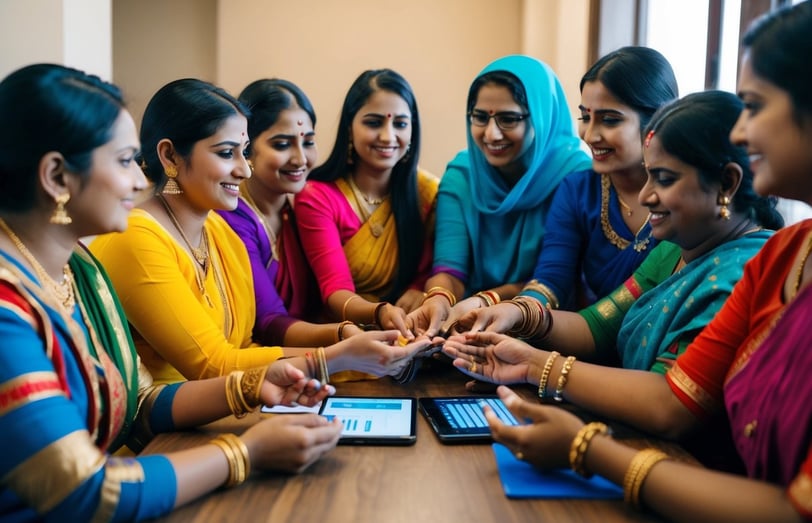Government Grants for Women Entrepreneurs in India: Financial Opportunities for Growth and Innovation
STARTUPSGOVERNMENT GRANTS
10/22/20246 min read
Women entrepreneurs play a vital role in India's economic development. With rising awareness about the importance of female leadership in business, various government initiatives have emerged to support them. Government grants specifically designed for women entrepreneurs provide essential financial aid, making it easier for them to start and grow their businesses.
These grants aim to foster entrepreneurship among women by helping them overcome barriers such as access to capital and resources. Programs like Stand-Up India and the MSME Champions scheme are examples of how the government is dedicated to creating a more equitable business environment. By facilitating access to funding and resources, these initiatives empower women to pursue their entrepreneurial dreams.
As the landscape of women entrepreneurship continues to evolve, understanding available government grants becomes crucial for aspiring female business owners. This assistance not only enhances their chances of success but also contributes to the broader goal of gender equality in the business world.
Overview of Government Grants for Women Entrepreneurs
Government grants play a crucial role in supporting women entrepreneurs in India. These grants facilitate access to capital, enabling them to start and grow their businesses. Various schemes are available, each designed to meet different needs and circumstances.
Eligibility Criteria and Grant Application Process
Eligibility criteria vary by program but generally include factors such as age, business type, and project viability. Women entrepreneurs must be Indian citizens and often need to present a clear business plan.
The application process typically involves submitting necessary documents, including proof of identity, business registration, and financial projections. Many programs encourage online submissions, streamlining the process.
For example, the Prime Minister’s Employment Generation Programme (PMEGP) supports projects that promote self-employment. Applicants can expect to receive guidance from local officials during their application.
Key Government Grant Programs in India
Several key programs provide financial assistance to women entrepreneurs.
Prime Minister’s Employment Generation Programme (PMEGP): Offers subsidies based on project location and type, aiding in setting up new businesses.
Mudra Yojana: Provides loans up to INR 10 lakhs with minimal paperwork, targeting small businesses.
Mahila Udyam Nidhi Scheme: Focuses on women-led startups, giving financial support to expand existing businesses.
Dena Shakti Scheme: Assists women in various sectors, from manufacturing to services, with significant financial backing.
Udyogini Scheme: Targets women from economically disadvantaged backgrounds, facilitating loans for women entrepreneurs.
Cent Kalyani Scheme: Specifically designed to support women from marginalized communities in starting their enterprises.
These programs help bridge funding gaps and encourage women to enter the business sector more confidently.
Region-Specific Grant Opportunities
In India, various regional initiatives support women entrepreneurs with financial aid and resources. These grant opportunities cater to specific states and can significantly help women launch or grow their businesses.
North and East India Initiatives
In the north and east regions, states like Assam and Bihar offer specific grants. The Assam government has introduced schemes for women entrepreneurs that include subsidized loans and financial assistance through the Handloom and Handicrafts Development Scheme. In Bihar, the government provides support under the Bihar Start-Up Policy, which encourages innovation and entrepreneurship among women.
In West Bengal, the Kanyashree Prakalpa scheme targets young women, helping them start small businesses with grants and training programs tailored for their needs. Additionally, Nagaland has launched initiatives to promote women's entrepreneurship through grants focused on local artisans and small enterprises.
South India Initiatives
In southern India, states such as Karnataka and Kerala have strong support systems for female entrepreneurs. The Karnataka State Women's Development Corporation (KSWDC) offers various financial schemes, including interest-free loans for women in business. This aids in launching new ventures and expanding existing businesses.
Kerala actively promotes women's entrepreneurship through schemes like the Udyogini Scheme, which provides financial support and training for women to develop their business skills. The Vishwakarma Scheme in both states supports craft-based businesses, offering grants and technical assistance to enhance product quality.
West India Initiatives
In western India, Goa and Rajasthan have specific programs for women entrepreneurs. The Goa Chamber of Commerce provides grants and workshops for women-led businesses, helping them network and grow.
In Rajasthan, grants under the Mahatma Gandhi Employment Guarantee Act support women entrepreneurs in rural areas. This scheme emphasizes job creation and includes financial aid to help set up small-scale industries. Furthermore, various initiatives focus on encouraging women to enter sectors like handicrafts and tourism.
Central and Nationwide Schemes
Apart from state-specific opportunities, there are central schemes supporting women entrepreneurs. The Stand-Up India Scheme provides loans between ₹10 lakhs to ₹1 crore specifically aimed at women and marginalized communities. This initiative is available across all states, including Telangana, which focuses on promoting entrepreneurship in both rural and urban settings.
The MSME Champions platform aims to support women-led micro, small, and medium enterprises by offering various grants and resources nationwide. This platform helps women entrepreneurs access government initiatives, funding, and training, contributing to their business growth.
Support Mechanisms and Funding Beyond Grants
Women entrepreneurs in India can access various support mechanisms and funding sources beyond grants. These options include venture capital, seed funding, and credit guarantees that help solidify their business foundation and growth potential.
Venture Capital and Seed Funding for Women Entrepreneurs
Venture capital funds play a significant role in supporting women-led startups. These funds typically provide investments to companies demonstrating high growth potential in exchange for equity. For women entrepreneurs, funds like Venture Highway and She Capital specifically focus on female-led businesses, offering not just capital but also mentorship and networking opportunities.
Seed funding is another crucial option. This initial investment helps companies develop their product or service before scaling up. Many angel investors actively seek women-led businesses, understanding the unique perspectives women bring to the entrepreneurial landscape. Programs under the Fund of Funds for Startups Scheme further aim to boost investments in women entrepreneurs, creating a more equal platform for success.
Credit Guarantee and Collateral-Free Loans
Credit guarantee schemes provide financial support for women entrepreneurs, allowing them to avoid the burden of collateral. The Credit Guarantee Fund Trust for Micro and Small Enterprises is a prime example. This fund offers guarantees to banks, encouraging them to lend to women-owned businesses without requiring physical assets as security.
Collateral-free loans help reduce the barriers women face in accessing funds. These loans offer quick access to capital, allowing entrepreneurs to invest in marketing assistance or product development. Many banks have specific schemes targeting women, making it easier for them to start and sustain their businesses. This financial infrastructure encourages a more inclusive entrepreneurial ecosystem.
Capacity Building and Skill Development
Capacity building and skill development are crucial for empowering women entrepreneurs in India. These initiatives provide the necessary training, mentorship, and resources that can help women overcome challenges in starting and managing their businesses effectively.
Training Programs and Workshops
Training programs and workshops focus on equipping women with essential skills. The government offers several initiatives, such as the Mahila Coir Yojana, which supports women artisans in the coir industry. This program includes hands-on training in coir spinning and provides a stipend to participants.
Workshops also cover various topics like financial literacy, marketing strategies, and digital literacy. Local institutions collaborate with the Ministry of Skill Development and Entrepreneurship to create tailored courses. This approach ensures that the training meets the specific needs of women entrepreneurs in different sectors.
Mentoring Networks and Advisory Services
Mentoring networks play a vital role in the success of women entrepreneurs. These networks connect aspiring business owners with experienced professionals who can offer guidance and support. Mentors provide insights into best practices, helping mentees navigate challenges.
Advisory services are also available, focusing on business development and strategic planning. Many organizations, including government bodies, facilitate these connections. They aim to foster an environment where women can share experiences and gain confidence in their entrepreneurial journey.
Virtual Incubation Program for Women Entrepreneurs
The Virtual Incubation Program for women entrepreneurs offers a unique platform for business growth. This program provides online resources, webinars, and virtual networking opportunities. Participants can access expert advice and join discussions tailored to their needs.
The program focuses on social entrepreneurship, encouraging women to create businesses that not only generate profit but also benefit their communities. By fostering collaboration and innovation, the virtual incubation program serves as a valuable tool for building a resilient entrepreneurial ecosystem for women.
Fostering Economic Independence and Social Empowerment
Women entrepreneurs can drive economic independence and social empowerment through targeted initiatives and innovative business practices. These elements are crucial for creating opportunities that lead to sustainable growth and self-reliance.
Economic Independence Through Entrepreneurship
Entrepreneurship serves as a powerful tool for women seeking economic independence. By starting their own businesses, women can generate income and build personal wealth. Government grants support this initiative by providing financial resources to startups.
Access to training and mentorship programs also enhances skills and knowledge. This support enables women to navigate challenges in the business landscape effectively. According to recent reports, around 89% of women-owned enterprises in India operate year-round, reflecting their commitment and capability to contribute to the economy.
Role of Social Entrepreneurship in Empowerment
Social entrepreneurship focuses on generating social impact alongside profit. Women entrepreneurs often engage in businesses that address community needs. This approach not only creates jobs but also increases social awareness.
Programs like the Beti Bachao Beti Padhao Scheme aim to empower women through education and support. By integrating social causes into their businesses, women can foster community growth while achieving personal goals. This dual focus promotes a culture of collaboration and mutual support.
Establishing a Sustainable Business Model
Creating a sustainable business model is essential for long-term success. Women entrepreneurs should consider various strategies for sustainability. This includes understanding the local market and aligning their products or services with community needs.
Financial planning and budgeting are also key for maintaining operations. Utilizing available government grants can support these efforts by mitigating initial costs. A well-defined business model allows women to adapt and thrive in the ever-evolving startup ecosystem, ensuring their business remains relevant and impactful.




Address
Bhilai Ofice :- Hall No. 02, 2nd floor, Chauhan state, GE Road Supela, Bhilai, CG 490023
Pune Office:- 2nd Floor, Jera Junction. Above Latur Urban Cooperative Bank, Lullanagar Kondhawa, Kondhwa Rd, Lulla nagar, Pune, Maharashtra 411040
Contacts
+91 8269269265
info@arthiq.co.in
admin@arthiq.co.in
Subscribe to our newsletter
Quick Links
Our Partners & Associates














© 2024 ARTHiQ.co.in. All Rights Reserved
